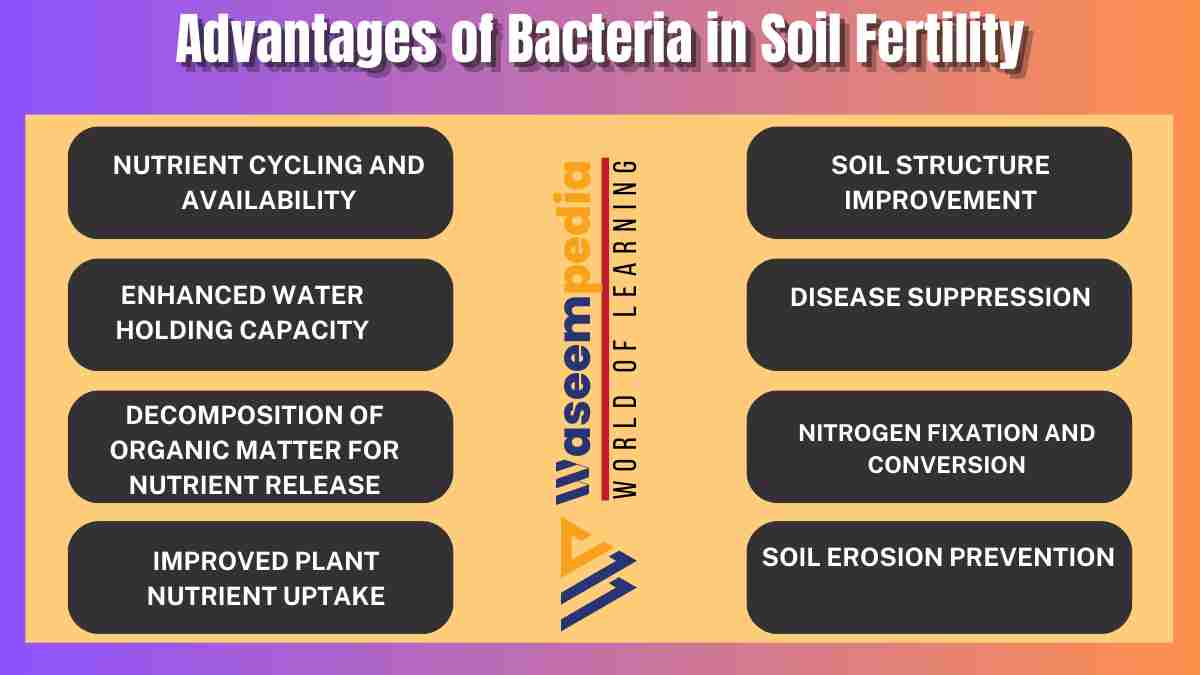Soil fertility is essential for robust plant growth, sustainable agriculture, and ecosystem health. Bacteria, as integral components of the soil micro biome, play a significant role in enhancing soil fertility.
These microscopic organisms contribute to nutrient cycling, organic matter decomposition, and plant-microbe interactions, ultimately improving soil quality and supporting healthy plant growth.
Bacteria are instrumental in enhancing soil fertility through their involvement in nutrient cycling, organic matter decomposition, nitrogen fixation, phosphorus solubilization, plant-microbe interactions, disease suppression, and soil structure enhancement.
Harnessing the advantages of bacteria in soil fertility is essential for sustainable agricultural practices, improving crop yields, and maintaining the overall health and productivity of ecosystems.
In this article, we will explore the advantages of bacteria in soil fertility and highlight their vital contributions.
Introduction of Bacteria in Soil Fertility
Soil fertility refers to the soil’s capacity to provide essential nutrients, water, and a favorable environment for plant growth. Bacteria contribute significantly to soil fertility through their diverse metabolic capabilities and interactions with plants. Understanding the advantages of bacteria in soil fertility is crucial for sustainable agriculture and environmental stewardship.
1. Understanding Soil Fertility
Soil fertility is the result of complex interactions between physical, chemical, and biological factors. It encompasses the availability of essential nutrients, the soil’s water-holding capacity, pH balance, organic matter content, and microbial activity. Bacteria, as important members of the soil microbial community, play a vital role in shaping soil fertility dynamics.
2. Bacteria’s Role in Nutrient Cycling
Nutrient cycling involves the transformation and recycling of essential nutrients in the soil. Bacteria contribute significantly to nutrient cycling by decomposing organic matter and releasing nutrients back into the soil.
Through enzymatic reactions, bacteria break down complex organic compounds, such as dead plant material or animal waste, into simpler forms that can be readily absorbed by plants, ensuring the continuous availability of nutrients.
3. Organic Matter Decomposition
Bacteria are key players in the decomposition of organic matter in the soil. They secrete enzymes that break down complex organic compounds, such as cellulose and lignin, into simpler molecules.
This breakdown process releases nutrients, including nitrogen, phosphorus, and potassium, from organic matter, making them accessible to plants. The decomposition of organic matter by bacteria also contributes to the formation of humus, a vital component of fertile soils.
4. Nitrogen Fixation
Nitrogen is an essential nutrient required for plant growth and development. However, most plants cannot utilize atmospheric nitrogen directly. Certain bacteria, known as nitrogen-fixing bacteria, have the unique ability to convert atmospheric nitrogen into a biologically available form called ammonia.
This process, called nitrogen fixation, is facilitated by bacteria in symbiotic relationships with plants or free-living bacteria in the soil. By fixing atmospheric nitrogen, bacteria contribute to increasing soil fertility and reducing the need for synthetic nitrogen fertilizers.
5. Phosphorus Solubilization
Phosphorus is another vital nutrient for plant growth, but it often exists in forms that are not readily available to plants. Bacteria play a crucial role in phosphorus solubilization, converting insoluble forms of phosphorus into soluble forms that can be easily taken up by plant roots.
Bacteria achieve this through the secretion of organic acids and enzymes that break down phosphate compounds, making phosphorus more accessible to plants and enhancing soil fertility.
6. Plant-Microbe Interactions
Bacteria form intricate interactions with plants, shaping the soil environment and contributing to plant health. Some bacteria establish mutualistic relationships with plants, promoting nutrient uptake, growth, and disease resistance.
These bacteria can produce growth-promoting substances, enhance nutrient availability, stimulate root development, and activate the plant’s defense mechanisms. Such interactions contribute to improved soil fertility by supporting healthy plant growth and productivity.
7. Disease Suppression
Certain bacteria have the ability to suppress plant diseases caused by pathogenic microorganisms. These beneficial bacteria, often referred to as biocontrol agents, can produce antibiotics, enzymes, and other compounds that inhibit the growth of plant pathogens.
By suppressing diseases, bacteria contribute to plant health and reduce the need for chemical pesticides, thus promoting a more sustainable approach to agriculture and preserving soil fertility.
8. Soil Structure Enhancement
Bacteria also play a role in enhancing soil structure, which is crucial for soil fertility. They produce substances that act as binding agents, improving soil aggregation and stability. This enhances soil aeration, water infiltration, and root penetration.
Additionally, bacterial activities contribute to the formation of soil aggregates, creating pore spaces that allow for better water and nutrient movement. Improved soil structure supports healthy root growth and nutrient uptake, further enhancing soil fertility.

